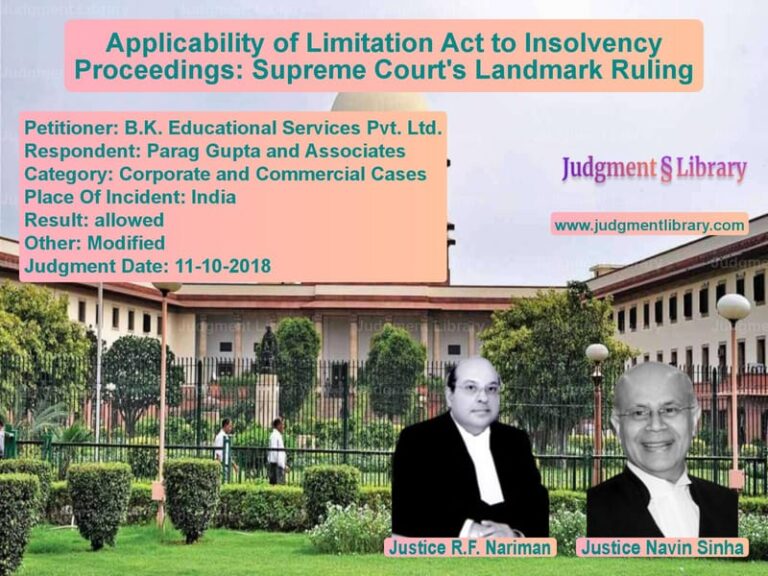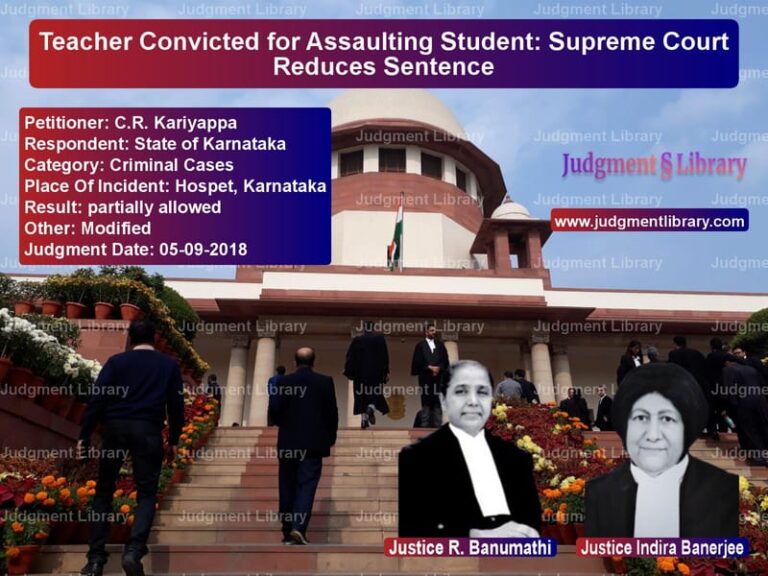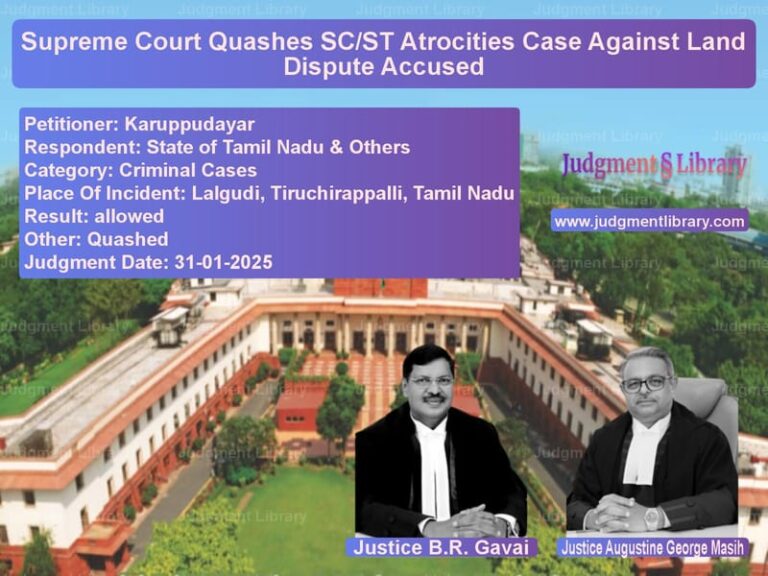Dismissal of Special Leave Petition Against Quashing of FIR in Criminal Case
The case before the Supreme Court involves a Special Leave Petition (SLP) filed by the petitioner, R. Abirami, who sought to challenge the order passed by the Madras High Court on 20th September 2021. The High Court had quashed the FIR in Crime No. 07 of 2021, dated 6th May 2021, and the subsequent criminal proceedings under Section 482 of the Code of Criminal Procedure (CrPC). The Supreme Court, after hearing the arguments and reviewing the submissions, dismissed the petition, upholding the High Court’s decision. This blog post will explore the details of the case, the arguments presented by both the petitioner and respondents, the Court’s reasoning, and the final outcome.
Background of the Case
The case arose when an FIR was filed by the petitioner, R. Abirami, on 6th May 2021, alleging criminal actions committed by the respondents, including D. Santhanam and others. The petitioner approached the Madras High Court seeking relief, and the High Court, in its judgment dated 20th September 2021, decided to quash the FIR and the criminal proceedings based on its powers under Section 482 of the CrPC, which allows the court to intervene in matters to prevent the abuse of legal process.
Read also: https://judgmentlibrary.com/supreme-court-modifies-sentence-in-maharashtra-assault-case/
R. Abirami, not satisfied with the High Court’s order, filed a Special Leave Petition before the Supreme Court, challenging the decision to quash the FIR. The petitioner, representing herself, and the counsel for the respondents were heard at length. The Supreme Court, after considering the submissions of both parties and reviewing the written submissions provided by the petitioner, concluded that there was no reason to interfere with the High Court’s decision.
Petitioner’s Arguments
The petitioner, R. Abirami, presented several points in her appeal to the Supreme Court:
- Improper Quashing of FIR: The petitioner argued that the High Court’s decision to quash the FIR was improper and unjust. She believed that the allegations in the FIR had merit, and that the case should have been allowed to proceed through the normal judicial process.
- Failure to Address the Merits: The petitioner contended that the High Court failed to properly address the merits of the case before quashing the FIR. She believed that the case involved serious criminal offenses and deserved to be heard in full, rather than being dismissed prematurely.
- Prejudice to Victim: The petitioner expressed concern that quashing the FIR would be prejudicial to the victim’s rights and hinder the pursuit of justice. She emphasized that the victims of the alleged offenses should not be denied their day in court.
Respondents’ Arguments
The respondents, represented by their counsel, presented their defense as follows:
- Absence of Prima Facie Case: The respondents argued that the FIR lacked a prima facie case for criminal prosecution. They contended that the allegations made in the FIR were without sufficient evidence to support the claims, and as such, the High Court’s decision to quash the proceedings was appropriate.
- Use of Section 482 CrPC: The respondents highlighted that the High Court acted within its jurisdiction under Section 482 of the CrPC, which grants the power to quash criminal proceedings if it is deemed that continuing with the case would amount to an abuse of the legal process. They maintained that the High Court rightly exercised its discretion in quashing the FIR.
- Public Interest and Judicial Economy: The respondents also pointed out that continuing with the case would serve no public interest, given the lack of merit in the allegations. They emphasized the importance of judicial economy, arguing that frivolous cases should not be allowed to drain the resources of the judiciary.
The Court’s Reasoning
After considering the arguments presented by both sides, the Supreme Court addressed the following points:
- Scope of Section 482 CrPC: The Court noted that Section 482 of the CrPC provides the High Court with the power to quash an FIR and criminal proceedings if it finds that there is no sufficient ground for proceeding with the case. The Court emphasized that this power should be exercised cautiously and sparingly, especially in cases where allegations, on their face, seem to lack merit.
- Judicial Precedent: The Court referred to previous judicial precedents, where it had ruled that courts should avoid interfering with the discretion of the High Court under Section 482 unless there was a clear violation of legal principles or judicial discretion. In this case, the Court found no such violation, and hence, dismissed the petition.
- No Grounds for Interference: The Court concluded that the petitioner had failed to demonstrate sufficient grounds for interfering with the High Court’s order. The FIR had been quashed based on the lack of a prima facie case, and the Supreme Court found no error in the High Court’s judgment. Therefore, the Court dismissed the petition.
The Court’s Decision
In its final order, the Supreme Court dismissed the Special Leave Petition filed by the petitioner. The Court observed that after considering the written submissions and the oral arguments, there was no reason to interfere with the order of the Madras High Court. As a result, the decision to quash the FIR and the criminal proceedings stood. The Court did not award any costs and disposed of any pending applications in the case.
Read also: https://judgmentlibrary.com/anticipatory-bail-granted-in-rape-case-supreme-courts-detailed-analysis/
Conclusion
This case highlights the importance of judicial discretion under Section 482 of the CrPC, which allows the High Court to quash FIRs and criminal proceedings in appropriate cases. The Supreme Court upheld the decision of the High Court, reinforcing the principle that the power to quash proceedings should be exercised carefully and only when the case does not meet the necessary criteria for a criminal trial. The dismissal of the petition reflects the Court’s stance on ensuring that legal processes are not abused by frivolous or baseless cases, and it emphasizes the importance of the judiciary’s role in safeguarding the interests of justice.
Petitioner Name: R. Abirami.Respondent Name: D. Santhanam & Others.Judgment By: Justice Ajay Rastogi, Justice B.V. Nagarathna.Place Of Incident: Madras, Tamil Nadu.Judgment Date: 06-09-2022.
Don’t miss out on the full details! Download the complete judgment in PDF format below and gain valuable insights instantly!
Download Judgment: r.-abirami-vs-d.-santhanam-&-other-supreme-court-of-india-judgment-dated-06-09-2022.pdf
Directly Download Judgment: Directly download this Judgment
See all petitions in Fraud and Forgery
See all petitions in Bail and Anticipatory Bail
See all petitions in Contempt Of Court cases
See all petitions in Judgment by Ajay Rastogi
See all petitions in Judgment by B.V. Nagarathna
See all petitions in dismissed
See all petitions in supreme court of India judgments September 2022
See all petitions in 2022 judgments
See all posts in Criminal Cases Category
See all allowed petitions in Criminal Cases Category
See all Dismissed petitions in Criminal Cases Category
See all partially allowed petitions in Criminal Cases Category







